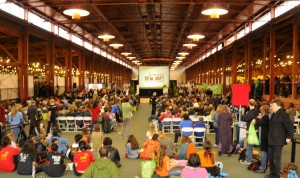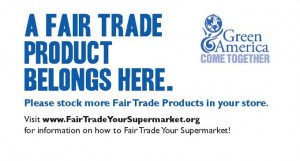Today, the Hershey Company’s board of directors and shareholders came together for their annual meeting in Hershey, Pennsylvania.
So, what better day than today to call on Hershey’s to chart a new course into a future free of child labor and poverty in communities that grow the company’s cocoa.
Green America’s Fair Trade coordinator, Elizabeth O’Connell and former Global Exchange Fair Trade intern, Shelley Alingas attended the shareholder meeting and were able to get up to the microphone and ask questions about child labor and speak out on behalf of the thousands of West African children forced into labor on the cocoa fields during the Q&A period.
The Raise the Bar, Hershey Campaign, sponsored by Global Exchange, Green America, and the International Labor Rights Forum, also used today to announce the winners of the Hershey Brand Jamming contest. The Brand Jamming contest brought attention to Hershey’s failure to crack down on child labor and other abuses in its cocoa supply chain by asking activists all over to use their creativity to create mock advertisements telling Hershey’s to raise the bar on their corporate social responsibility.
The Grand Prize overall winner of $1,000 was Jason Pearson of San Clemente, CA whose one-minute mock video advertisement “Brand Jam” tells the real story of where cocoa comes from.
Thousands of people all over voted for their favorite entries for the best slogan, best video, and best ad. Congratulations to all our winners and entrants! A big thank you also goes out to all those who voted.
The winner for Best Slogan: “Hershey: Sweet Chocolate. Bitter Story” submitted by Tyson Weems of Portland, ME.
The winner for Best Video: Behind the Hershey Smiles, submitted by Aaron Thurman: Indianapolis, IN.
 The winner for Best Poster: Children Behind Bars, submitted by Jason Pearson of San Clemente, CA
The winner for Best Poster: Children Behind Bars, submitted by Jason Pearson of San Clemente, CA
All first place winners will receive a Fair Trade chocolate gift basket. The winning entries will be used by the Raise the Bar Hershey campaign to call attention to Hershey’s failure to address child and forced labor in its cocoa supply chain. Winning entries will be featured at Green Festivals nationwide, on t-shirts, buttons, and bumper stickers. For more on the winners and a list of the runner-ups, visit the Brand Jam winners page.
To reinforce the message that has been sent at the Hershey’s shareholder meeting concerned consumers across the country are sending emails to Hershey and posting on the company’s Facebook wall. They join the 30,000 people who have already contacted the company to make it clear that cocoa made with forced child labor is unacceptable.
As GX’s Fair Trade Cocoa Director, Adrienne Fitch-Frankel states:
“Hershey shareholders deserve to know the facts: Hershey has failed to eliminate child and forced labor from its cocoa supply chain, nearly a decade after committing to do so. This creates a dangerous level of risk for investors, and an intolerable situation for the children effected.”
Let your voice be heard. Send a message to Hershey’s board and shareholders by signing our online petition. We are trying to collect 10,000 new signatures today to send a clear message to shareholders.
Stay connected with Global Exchange’s Fair Trade cocoa campaign by signing up to their e-mail list and get the latest updates on the Raise the Bar campaign and other actions you can take to get Hershey’s to go Fair Trade.





